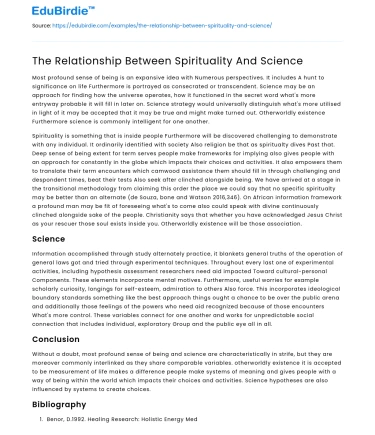Introduction
The relationship between spirituality and science has long been a topic of intense debate and inquiry. While spirituality is often rooted in personal beliefs, religious experiences, and the pursuit of meaning, science is grounded in empirical evidence, experimentation, and rational inquiry. Despite their ostensibly divergent paths, both seek to understand the universe and humanity's place within it. The intersection of these domains raises questions about the nature of existence, the potential for harmony between belief systems, and the limits of human understanding. This essay explores the complex relationship between spirituality and science, examining areas of convergence and divergence, and addressing counterarguments to provide a holistic perspective on this multifaceted topic.
Convergence of Spirituality and Science
At first glance, spirituality and science may seem incompatible. However, upon closer examination, it becomes evident that they share common ground, particularly in their pursuit of understanding the universe. For instance, both fields explore the origins of existence and the fundamental nature of reality. Quantum physics, a branch of science that examines the behavior of particles on a subatomic level, has opened discussions about the interconnectedness of all things, echoing spiritual concepts of unity and oneness. Physicist Fritjof Capra, in his book "The Tao of Physics," highlights parallels between quantum mechanics and Eastern spiritual traditions, suggesting that scientific discoveries can complement spiritual insights (Capra, 1975).
Save your time!
We can take care of your essay
- Proper editing and formatting
- Free revision, title page, and bibliography
- Flexible prices and money-back guarantee
Moreover, the study of consciousness has brought spirituality and science into closer dialogue. Neuroscience is beginning to uncover the biological basis of spiritual experiences, such as meditation and prayer, suggesting that these practices can lead to measurable changes in brain function and structure. Studies have shown that regular meditation can increase the thickness of the prefrontal cortex, an area of the brain associated with decision-making and emotional regulation (Lazar et al., 2005). Such findings suggest a potential synergy between spiritual practices and scientific understanding, demonstrating how they can together enhance human well-being.
Nevertheless, the convergence of spirituality and science does not imply that they are interchangeable. While science is driven by skepticism and requires empirical validation, spirituality often relies on personal experience and faith. Despite these differences, the increasing dialogue between the two suggests a growing recognition of their complementary roles in exploring the mysteries of the human condition.
Divergence and Conflict between Spirituality and Science
Despite areas of convergence, the divergence between spirituality and science is evident in their methodologies and epistemologies. Science is grounded in the scientific method, characterized by hypothesis testing, observation, and repeatability. In contrast, spirituality often encompasses beliefs that are not subject to empirical scrutiny. This fundamental difference in approach can lead to conflicts, particularly when spiritual claims contradict scientific evidence.
A notable example of this conflict is the debate over creationism and evolution. Creationism, based on a literal interpretation of religious texts, posits that a divine being created the universe and all life within it. This view directly contradicts the theory of evolution, which is supported by extensive scientific evidence and explains the diversity of life through natural selection and genetic variation. The controversy highlights the tensions between faith-based beliefs and evidence-based science, raising questions about the role of spirituality in scientific discourse.
Additionally, some scientific materialists argue that spirituality is an outdated framework, unnecessary for understanding the universe. Notable biologist Richard Dawkins, in "The God Delusion," contends that religious belief is incompatible with scientific reasoning and that spirituality can hinder scientific progress (Dawkins, 2006). While this perspective underscores the potential for conflict, it also emphasizes the need for a nuanced understanding of the distinct contributions of spirituality and science to human knowledge.
Reconciling Spirituality and Science
Reconciling spirituality and science requires an appreciation of their unique purposes and methodologies. One approach is to view them as complementary rather than contradictory, with each offering valuable insights into different aspects of existence. Spirituality can provide meaning, purpose, and ethical guidance, enriching individuals' lives and fostering a sense of community. Science, on the other hand, offers a rigorous framework for exploring the natural world and developing technologies that improve living conditions.
Interdisciplinary fields such as spiritual psychology and medical humanities exemplify efforts to bridge the gap between spirituality and science. By integrating spiritual perspectives into scientific research and clinical practice, these fields aim to address the holistic needs of individuals, acknowledging the interplay between mind, body, and spirit. For example, incorporating spiritual care into healthcare settings has been shown to improve patient outcomes by addressing existential concerns and enhancing emotional well-being (Koenig, 2012).
Ultimately, the reconciliation of spirituality and science calls for openness to diverse ways of knowing and a willingness to engage in dialogue. By recognizing the strengths and limitations of each domain, individuals and societies can cultivate a more comprehensive understanding of the world, enhancing both personal fulfillment and collective progress.
Conclusion
The relationship between spirituality and science is complex and multifaceted, characterized by both convergence and divergence. While they differ in their methodologies and epistemologies, both seek to understand the universe and human existence. Areas of convergence, such as the study of consciousness, demonstrate the potential for synergy between spiritual practices and scientific inquiry. However, conflicts, exemplified by the debate over creationism and evolution, underscore the challenges of reconciling faith-based beliefs with evidence-based science.
Ultimately, reconciling spirituality and science requires a recognition of their complementary roles and an openness to diverse perspectives. By embracing both domains, individuals can enrich their understanding of the world, finding meaning and purpose while benefiting from scientific advancements. As humanity continues to explore the mysteries of existence, the dialogue between spirituality and science remains an essential component of the quest for knowledge and understanding.






 Stuck on your essay?
Stuck on your essay?

